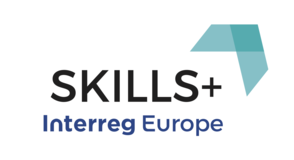

Between September and November 2017, each of the territories addressed by SKILLS+ was visited by a small international group of peer reviewers. Each group included both representatives of some of the other project partners and external stakeholders, including Managing Authority representatives, governmental agencies and businesses. Each peer review visit took two or three days sparked with meetings with different key actors for the promotion of rural areas' small companies' digitalisation. For all participants, the peer review was a very intense and fruitful learning experience. We are happy to share here some of the feedback of our review participants.
1) Paula Karppinen (@PaulaKarppinen), Regional Development Specialist in Regional Council of Kainuu (Finland)

1. Was it the first time for you to participate in a peer review?
Yes, this was the first peer review experience for me.
2. Why did you decide to participate in the SKILLS+ peer review exercise?
It seemed like a good way to work and learn about region’s good practices in detail.
3. What did you like most about the peer review?
To meet the local experts in various fields and to openly talk about the good and bad experiences.
4. How will the learning gained from the peer review be helpful in the future?
Peer review method itself could be applied locally. The experiences shared by local actors and external peer reviewers and comparison of different regions help to develop the own region. Potential new project partners.
2) Vladimir Minev - Head of the Information Services Department of Bulgarian SME Promotion Agency (Bulgaria)

1. Was it the first time for you to participate in a peer review?
Yes, it was my first time to participate as a peer review member.
2. Why did you decide to participate in the SKILLS+ peer review exercise?
I am working as Head of the Information Services Department in the Bulgarian SME Promotion Agency that is responsible policy organization within the project. The Agency as a stakeholder is involved in the project implementation since the beginning. It is very useful for us to learn from the good practices from other countries and try to implement some of them in Bulgaria.
3. What did you like most about the peer review?
The presentation of Vitnett, Oppdal, the municipality owned company, provider of very good modern infrastructure along with a variety of ICT related services was really impressive for me. It is a best example of how the regional authorities support the involvement of ICT for regional development.
4. How will the learning gained from the peer review be helpful in the future?
For me personally the Peer Review was very useful because my agency as a part of the Bulgarian Ministry of Economy is the state institution mostly involved in the implementation of ICT as a key enabling technology for development of traditional industry sectors and regional development. I am also a member of the national Working Group for development of a plan of measures related to Industry 4 in Bulgaria. In this regard I am happy that due to my involvement in SKILLS+ project I received very important information.
3) Márta Regner, Project Manager at Pannon Novum Non-profit Ltd. (Hungary)

1. Was it the first time for you to participate in a peer review?
For me it was the 1st time to participate in a peer review visit. Comparing with my previous experiences, I found it more efficient and informative than a "normal" study tour, because we met face to face stakeholders and also could interview them which which helped to see the institutional system, the business environment, the strategy background but also the everyday problems and obstacles the SMEs face in digitalisation.
2. Why did you decide to participate in the SKILLS+ peer review exercise?
I had two motivational factors at the time of applying. First, that I have never participated in a peer review and wanted to see the method before West-Transdanubian PR, secondly I wanted to see what problems a small and medium-sized enterprise faces in another country.
3. What did you like most about the peer review?
Zadar Peer review visit was very useful, stakeholders were open and shared their experiences honestly with the PR team. PR members did their effort to share their regional best practices with local stakeholders in personal visits and in the final public session. There, we also highlighted those best practises what saw in Zadar county.
4. How will the learning gained from the peer review be helpful in the future?
I have learned a lot about another county's institutional background, about its strengths and weaknesses in digitalisation. I could compare it with Hungarian situation and hopefully use the best practices of Zadar in my region, too.